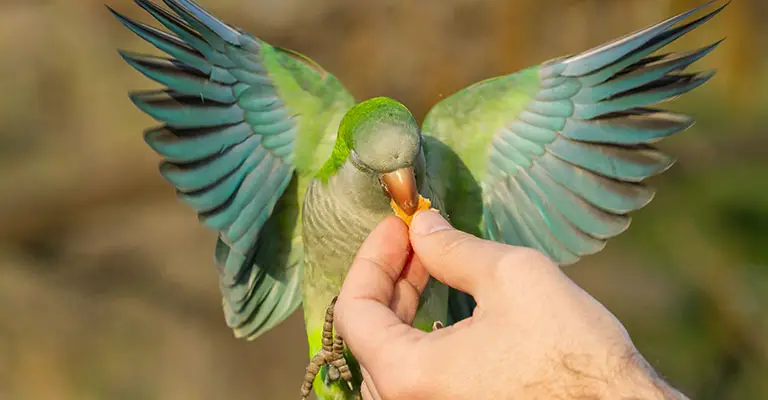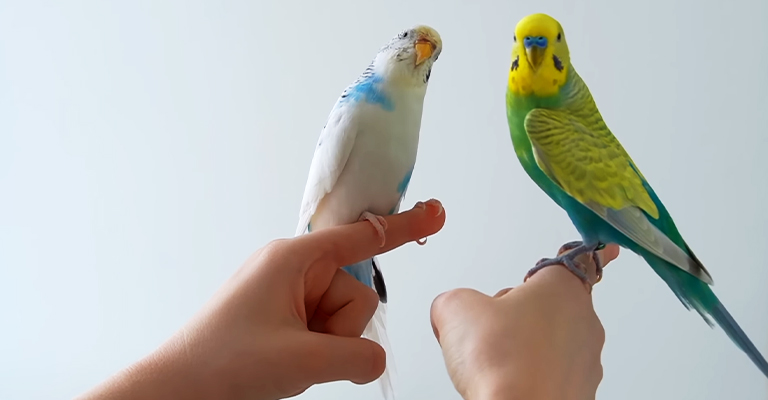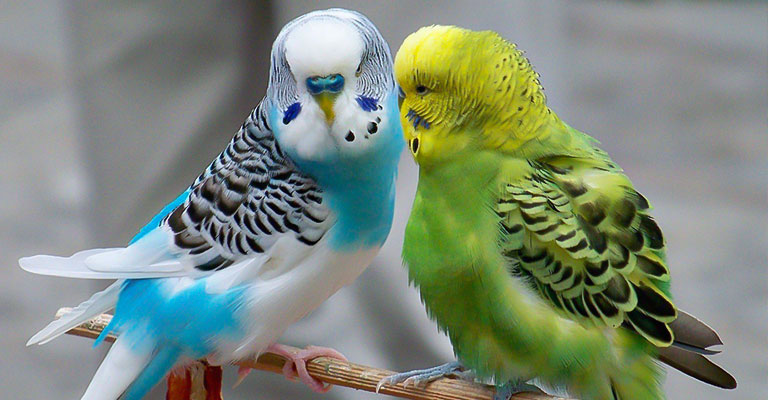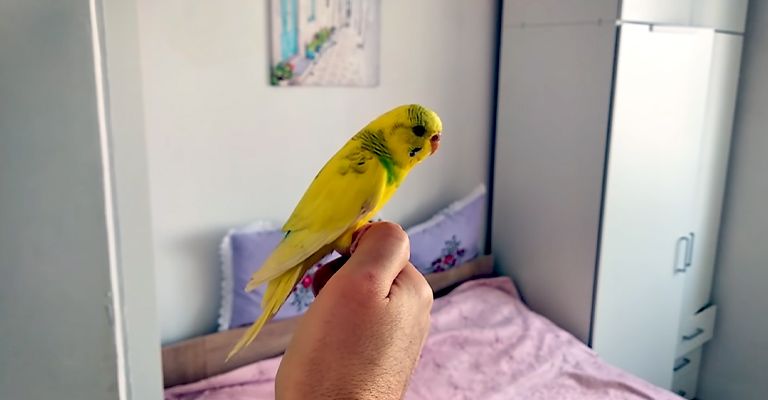Are you considering getting a parakeet as a pet? Parakeets can make wonderful, affectionate companions. Understanding the proper care for these colourful birds is essential to ensure they live a happy and healthy life.
So, how to take care of a parakeet? Proper care includes
- Providing a spacious and safe cage
- Feeding a balanced diet
- Regularly checking for signs of illness
- Providing opportunities for exercise, play, and socialization
Training and bonding with your parakeet can also greatly enhance their quality of life.
By reading on, you’ll understand how to create a nurturing environment for your parakeet. Get ready to learn everything you need to know about parakeet care.
Housing Your Parakeet

Parakeets are social, active birds that are easy to care for, but their living quarters are just as important as their diet and exercise routine.
It’s essential to provide your parakeet with a suitable cage that meets all its physical and psychological needs.
Recommended Size of Cage
A general rule of thumb is that the cage should be large enough for your parakeet to spread its wings and fly from perch to perch.
So the bigger is always better. If you have the room and resources, opt for a larger cage to give your feathered friends more space to fly and play.
Type of Cage Material
Parakeets are active birds and love to chew, so choosing a cage made from sturdy material that can withstand their beaks and claws is essential.
A cage made from wrought iron, stainless steel, or powder-coated metal is a good choice, as it’s durable, rust-resistant, and easy to clean.
Avoid cages made from plastic or soft metals, as they may crack or bend under the weight of your parakeet.
Ideal Location for Cage
The location of your parakeet’s cage is just as important as the size and material. Parakeets love natural light and fresh air, so choose an area near a window with access to natural light and fresh air.
Avoid placing the cage in direct sunlight or near a draft, as extreme temperatures can harm your bird. Additionally, it’s best to keep the pen away from noisy or stressful environments, such as the kitchen or a busy traffic area.
Diet for Your Parakeet

Parakeets are known for their playful and energetic nature, and it’s important to provide them with the proper nutrients to keep them healthy and happy.
Essential Food Items For Parakeets
To keep your parakeet healthy and happy, providing them with a balanced diet that includes the essential food items they need is important. These food items include:
- Pellets – Pellets are the staple food for parakeets. Look for high-quality pellets specifically formulated for parakeets, as these will provide all the nutrients your bird needs in a balanced form.
- Seeds – Make sure to choose a mix of different seeds, such as millet, sunflower, canary, and oats. Avoid giving your bird too many fatty seeds, such as safflower, as these can lead to obesity.
- Live food – Live food, such as mealworms, can be a great source of protein for your parakeet. However, they should be offered in small quantities.
Importance of Fresh Fruits and Vegetables
In addition to seeds and pellets, fresh fruits and vegetables are essential for a parakeet’s diet. They provide essential vitamins, minerals, and fibre, which help with digestion and overall health.
Fruits and vegetables also help keep your parakeet hydrated, which is crucial for their well-being.
Some of the benefits of fresh fruits and vegetables for parakeets include:
Vitamin A: Essential for good vision and healthy skin.
Vitamin C: Boosts the immune system and helps with skin health.
Fiber: Helps with digestion and prevents constipation.
Hydration: Keeps the parakeet hydrated and prevents dehydration.
Foods to Avoid
While it’s important to feed your parakeet a balanced and nutritious diet, it’s also crucial to avoid certain foods that can be harmful. Some of the food to avoid for parakeets include:
- Avocado: It contains persin, which can be toxic to birds.
- Chocolate: It has theobromine, which can be toxic to birds.
- Alcohol: This can cause liver and brain damage in birds.
- Caffeine: Caffeine can cause heart palpitations and death in birds.
Health: The Key to a Happy and Healthy Parakeet

When it comes to caring for a parakeet, one of the important aspects is their health. Here are some ways you can ensure your parakeet is doing well health-wise.
Importance of Regular Check-Ups by a Vet
Just like how we visit our doctor for regular check-ups, it’s equally important for your parakeet to have regular visits to the vet. Here are some of the benefits of regular check-ups:
- Early detection of illnesses: Regular check-ups can help detect diseases early on, making it easier to treat them.
- Vaccinations: A veterinarian can recommend and administer any necessary vaccinations to keep your parakeet healthy.
- Nutritional advice: A veterinarian can also advise on what type of food and supplements to give your parakeet to ensure they receive all the necessary nutrients.
- Parasite control: Regular check-ups can help keep your parakeet free from parasites, which can harm their health and well-being.
Preventive Measures to Ensure Good Health
Good hygiene practices are essential to keep your parakeet healthy. Here are some tips for maintaining good hygiene:
- Keep their cage clean: Clean the cage regularly to prevent the buildup of bacteria and parasites.
- Wash your hands before handling your parakeet: This will help prevent the transfer of bacteria and parasites.
- Clean their food and water dishes regularly: Dirty food and water dishes can harbour bacteria and parasites.
- Change the bedding frequently: Replace the bedding in the cage often to prevent the buildup of bacteria and parasites.
Exercise and Play: Keeping Your Parakeet Mentally and Physically Stimulated

As a parakeet owner, providing them with the proper care and attention they need to thrive is important.
Importance of Providing Mental and Physical Stimulation
Parakeets are active and curious birds that enjoy exploring their environment and engaging in physical activity. This helps them keep their muscles toned and minds active and reduces stress.
Regular exercise also helps to prevent boredom, which can lead to destructive behaviour such as feather plucking.
Provide Toys and Perches
One of the easiest ways to stimulate your parakeet physically is by providing toys and perches. Toys can range from simple things like ladders and swings to more complex bird-safe puzzles and toys. Make sure to rotate the toys in their cage regularly to keep things interesting.
Additionally, offering a variety of perches of different shapes, sizes, and textures will give your bird a chance to exercise its feet and work for different muscle groups.
Bonding with Your Parakeet

Spend time interacting with your birds by talking to them, offering treats, or playing with toys together. Regular interaction can build trust and strengthen the bond between you and your bird.
Conclusion
Taking care of a parakeet is a rewarding experience that requires patience, love, and commitment. Providing a proper diet, comfortable living quarters, and plenty of mental and physical stimulation will help ensure your bird stays happy and healthy.
Regular vet check-ups, cleaning, and socializing with your bird will also help build a strong bond and a loving relationship.
Remember to be consistent with their routine and always pay attention to their behaviour and body language so that you can spot any potential health problems early on.